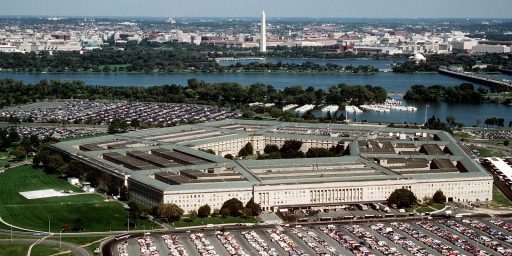Can the C.I.A. Really Be That Bad?
Brookings fellow Michael O’Hanlon asks “Can the C.I.A. Really Be That Bad?” in an op-ed in today’s NYT. [RSS]
There are three main issues to consider. Did Iraq possess chemical and biological weapons in the period just before the American-led invasion? Had it reconstituted its nuclear weapons program? And did it have meaningful, operational links to Al Qaeda?
As we have been learning over the past 15 months, and as the Senate report has just reconfirmed, the intelligence community indeed did get its answers to the first two questions wrong. But it clearly got the third right. Moreover, on the vital matter of chemical and biological agents, the agencies’ overall assessments were entirely reasonable. Yes, with the advantage of hindsight and complete access to Iraqi territory we now know they were largely wrong. But we did not have such hindsight or access in 2002 and early 2003.
Let’s face it, it would have taken an overwhelming body of evidence for any reasonable person in 2002 to think that Saddam Hussein did not possess stockpiles of chemical and biological agents. Admittedly, the intelligence community was too quick to believe the Iraqi exiles who told stories about mobile biological weapons laboratories and the like. But the basic facts still suggested strongly that Iraq had plenty of weapons of mass destruction. The United Nations and most European and Middle Eastern intelligence outfits had the same incorrect beliefs as our agencies, for the same understandable reasons. Saddam Hussein had used chemical weapons in war and against his own people in the 1980’s. For more than a decade after the Persian Gulf war, he obstructed international inspectors’ efforts to find and destroy such weapons, ensuring that United Nations sanctions that cost his country more than $100 billion would remain in place. He had his underlings confront the inspectors on several occasions in ways that led to military strikes against his security organizations. It certainly looked as if he valued chemical and biological agents a great deal, and was prepared to do a lot to hold onto them.
This is certainly correct. Indeed, aside from persistent rumors of materials having been smuggled to Syria and elsewhere, we still don’t know what happened to Saddam’s chemical stockpiles.
As for the supposed links between Saddam Hussein and Al Qaeda, the available evidence points strongly to one conclusion, the same conclusion that the intelligence community consistently reached: the Bush administration’s frequent insinuations that Saddam Hussein may have had an active collaboration with Al Qaeda, perhaps even assisting the 9/11 hijackers in some way, are without foundation. The intelligence community clearly stated this throughout the debate over Iraq. Even when Secretary of Defense Donald Rumsfeld was talking about “bulletproof” evidence of strong linkages in the summer and fall of 2002, the intelligence community demurred — within the halls of the executive branch and in public.
As I’ve argued repeatedly, it’s simply untrue that Saddam didn’t have significant connections with al Qaeda. More importantly, he had long been an active supporter of jihadist groups, most notably HAMAS, well before al Qaeda even existed.
But before we excoriate the work of our intelligence analysts — demoralizing their ranks and discouraging recruits from joining organizations that are being slammed by the right as well as the left — we need to take a deep breath. Intelligence is a difficult craft, and getting things wrong is an occupational hazard, not necessarily a sign of negligence or incompetence.
Agreed. It’s perfectly reasonable to conduct after-action assessments and try to fix problems. There are many. But leaders need to also keep in mind the nature of the business.





Part of the problem, I think, has been that the intelligence community at large has, over the last 10 to 15 years, been increasingly dependent on non-human intelligence gathering techniques. Human Intelligence, or HUMINT, has declined as a separate and distinct discipline, in large part for political reasons, though there were also legislative ones. (I’m thinking particularly of the laws that prohibited CIA personnel from dealing personally with people whom we knew to be criminals, for example.)
In any event, I think the Senate report makes clear that HUMINT is a vital element of the intelligence process. The intelligence community has been saying this for years, but it took the 9/11 and War on Terror to make it clear ot the rest of us. Unfortunately, it is an element that will take significant time and effort to rebuild after years of neglect.
To be fair to the intelligence community, the evidence to date suggests that Saddam was developing a crash program to manufacture CBW after sanctions were lifted. I have a summary of the CBW findings to date here.
“it would have taken an overwhelming body of evidence for any reasonable person in 2002 to think that Saddam Hussein did not possess stockpiles of chemical and biological agents.”
Let’s talk a little bit about reason. First of all, as a matter of reason, the absence of anything cannot be proved absolutely. Only the presence of something can be established beyond doubt.
Since Iraq was a state whose sovreignty was diminished, but not obliterated, the possiblity of something being hidden was always there. The real question then was how credible a threat was Saddam to possibly possess and use WMD’s, since neither their presence nor their absence could be established absolutely.
It is also the case that this question did NOT exist in isolation and at least SHOULD have been asked in terms of how credible was the Iraqi threat compared to that of Syria, Iran, Lybia, North Korea, &ect.
Any realistic analysis of Saddam as a covert WMD threat would have taken into account three things: intention, capacity, and opportunity. Based on the evidence openly availible in 2002, we could score Saddam quite high on intention–perhaps even 100 out of 100. But every other country above would score at least 80+ on that measure as well.
Iraq, however, would have scored by far the lowest on the measure of capacity. They had no significant nuclear facilities after the Israeli bombing, fully 50% of their military and more of their civilian infrastructure was destroyed in the First Gulf War, and the destruction was immediately followed by a decade of crippling economic sanctions.
Moreover, the destruction of a significant amount of their prior CW had been established through the UN inspection process. Nothing like these handicaps existed for ANY of the other countries on the list.
Finally, Iraq was perhaps the most watched country on earth, particularly in regard to WMD’s and a military recrudescence: satelites in the sky, U.S. planes flying routine missions in its airspace, electronic eavesdropping to redundancy, a limited and quite visible infrastructure for transporting goods (take a good look at an Iraqi map sometime), and repeated visits by inspectors on the ground. Under such conditions, a reasonable assesment would have given a low score to Iraqi opportunity as well.
NONE of the other countries on my list had equivalent hinderances to their opportunity. It is also noteworthy that when we are taken by surprise by a new nuclear country (such as we were by India) it is usually because we are NOT watching them very closely.
Now that we have obliterated and (at least on paper) reconstitued Iraqi sovreignty, it might seem that all this is moot. But if you think so, consider this.
If somewhere like Iran is anywhere near going nuclear, a shrewd ruler would hasten the process rather than stopping it. We have proven clearly that we are not going to even try to take down North Korea’s existing nukes by force, and with our troops strained to the limit in Iraq (something not likely to be fixed very soon) pursuing a similar military solution elsewhere is simply not in the cards.
A war was fought and a military solution was wasted on a completely unreasonable conviction (the famous “slam dunk”) to which all evidence was bent because Tony Blair and George W. Bush would have it so. No WMD’s were there and a reasonable person would not have expected them for the reasons I have given above.
No such war now can be fought to prevent anyone else from acquiring them and the Bush Doctrine now is a joke. Not the biggest one he’s perpetrated, but probably the most long lasting and the most dangerous for us all.
Isn’t reason a gas?
JM, Saddam was required to do more than simply get rid of his stockpiles. He was supposed to document the destruction or disposal of his stockpiles.
If he had done that, the negative would have been proven and there would have been no war. And he and his sons would still be in power in Baghdad, filling mass graves for sport.
That is something people forget: one of the reasons that virtually no one (including liberals and leftists) considered the possibility that Saddam would have destroyed his stockpiles *without* so documenting, is that to do so would be the worst of both worlds for him: risking the US and friends coming in to enforce the UN resolutions, but not having the benefit of these weapons in the first place.
He might have destroyed them. He might have moved them. But it would have been in his best interests to adhere to the agreement he made after the first Gulf War.
And one of the benefits of this war is that others around the world now realize that you can only push the U.S. so far. That is an asset for us in perilous times.
“If he had done that, the negative would have been proven and there would have been no war.”
I think, McGehee, that you have set a far lower standard for the “absence” of WMD’s than I remember the Bush Administration being prepared to accept prior to the invasion of Iraq. They at least gave me the impression that no matter what Saddam did, they were prepared to keep raising the bar on him.
As far as Iraq being a better place without Saddam, well, it damn well ought to be given the $ millions we’ve had to pour into making it so, and the insane deficit we’ve had to run to scratch up those $ millions.
But if that keeps us from forestalling a nuclear Iran (and I think it will) we have bought it at far too high a price. In other words, Atilla Girl, what is really important here is OUR best interests, not Saddam’s.
From the very first moment the invasion of Iraq was floated as a trial balloon in the press (all the way back in August 2002) any reasonable person could have seen the danger to OUR best interests from doing so: that it would cripple our capacity to take needed military action any where else while we suppressed an extended insurgency. This is a major reason why George H.W. did NOT overthrow Saddam after the First Gulf War.
It is also precisely what has happened.
And the belief that somehow all the countries with whom we are in verbal conflict would be overawed by our “show of force” and submit to our will, was exactly what it has been all along–a purile piece of childishness from members of an administration with largely no direct experience of war, the sort of folks who think that wars are won and “missions accomplished” merely by the “shock and awe” of the biggest bang.
Great job we’ve done in overaweing North Korea, right?